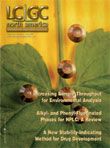Peaks of Interest
Agilent (Palo Alto, California) recently announced plans to open a new training center in Shanghai, China.
Agilent to open training center in Shanghai
Agilent (Palo Alto, California) recently announced plans to open a new training center in Shanghai, China. The center will train scientists across the Asia-Pacific region on key measurement technologies used in food safety, environmental testing, petrochemical testing, pharmaceutical testing, and life sciences.

Animal Testing and Preclinical Development
The new training center will be located next to Agilent's R&D and manufacturing center in Shanghai and will serve scientists from the industrial, government, and academic sectors within China and throughout the Asia-Pacific region.
Bruker Daltonics selected by Department of Homeland Security
Bruker Daltonics NBC Detection Corporation (Billerica, Massachusetts) has received a $0.75 million follow-on Phase II contract award from the U.S. Department of Homeland Security for further research and development into the Autonomous Rapid Facility Chemical Agent Monitor (ARFCAM). ARFCAM is intended to be the next generation chemical agent monitor for government facilities.
Thermo Electron completes Kendro acquisition
Thermo Electron (Waltham, Massachuets) has completed its acquisition of Kendro Laboratory Products (Charlotte, North Carolina).
In January, Thermo Electron had signed an agreement to acquire Kendro for $833.5 million. Kendro is a global leader in sample preparation products and services for life science, material science, and drug discovery applications.
Marijn E. Dekkers, president and chief executive officer of Thermo Electron, said, "Thermo is focused on providing total laboratory solutions and services to address our customers' needs, and Kendro's technologies nicely complement our existing portfolio of products and services."
Whatman appoints chief executive
Whatman (Clifton, New Jersey) recently appointed Timothy J. Haines chief executive.
Haines has a broad range of international management experience in the life sciences industry and was chief executive of Astex Technology (Cambridge, U.K.) for five years.
Tom McNally, a non-executive director of Whatman, has taken executive responsibility for R&D, business development, and sales. McNally will continue in this role as long as necessary and will then return to a non-executive position.

Understanding FDA Recommendations for N-Nitrosamine Impurity Levels
April 17th 2025We spoke with Josh Hoerner, general manager of Purisys, which specializes in a small volume custom synthesis and specialized controlled substance manufacturing, to gain his perspective on FDA’s recommendations for acceptable intake limits for N-nitrosamine impurities.
University of Rouen-Normandy Scientists Explore Eco-Friendly Sampling Approach for GC-HRMS
April 17th 2025Root exudates—substances secreted by living plant roots—are challenging to sample, as they are typically extracted using artificial devices and can vary widely in both quantity and composition across plant species.
Determining the Serum Proteomic Profile in Migraine Patients with LC–MS
April 17th 2025Researchers used liquid chromatography–mass spectrometry (LC–MS) in their proteomic analysis to compare the serum proteome of migraine patients with healthy controls and to identify differentially expressed proteins as potential migraine biomarkers.












